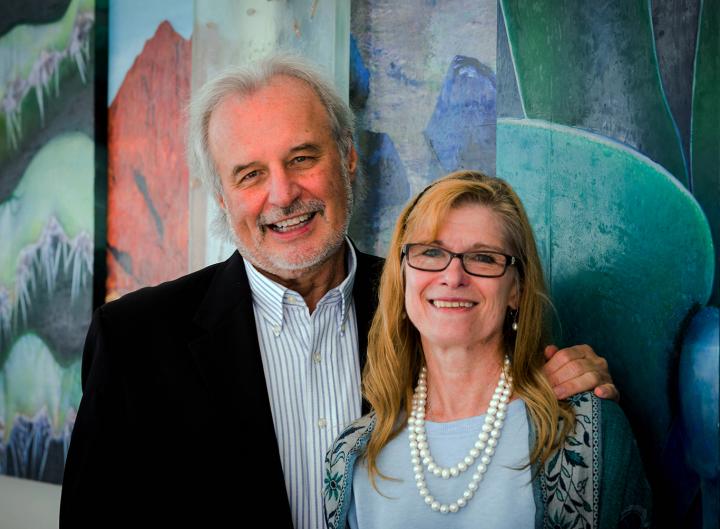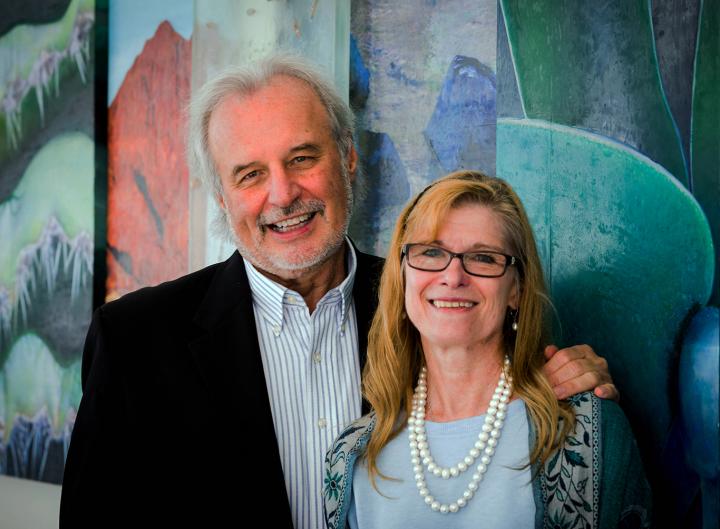
Credit: Maricruz Kwon, UTHealth
HOUSTON – (June 23, 2017) ¬- Just as he has changed the lives of people suffering from a devastating genetic disease, molecular endocrinologist John J. Kopchick, Ph.D., and his wife, Charlene, of Athens, Ohio, are paving the way for future scientists to do the same with a transformative $10.5 million gift to The University of Texas MD Anderson Cancer Center UTHealth Graduate School of Biomedical Sciences.
To spur future breakthroughs, the Kopchicks' gift will fund up to 15 student fellowships at the MD Anderson UTHealth Graduate School, where John Kopchick received his Ph.D. in 1980 and launched an illustrious career. The fellowships will accelerate the school's continued success in educating medical trailblazers.
"My success is dependent on something special, and that something special was my education at the Graduate School of Biomedical Sciences. It is nice to give something back," said John Kopchick, who received the Rosalie B. Hite Fellowship during his time at the MD Anderson UTHealth Graduate School.
Charlene Kopchick, assistant dean of students for campus involvement at Ohio University, is equally passionate about student education. She and her husband are the first in their respective families to go to college.
"There is a statement about giving forward and for me that is important. Had John not gotten scholarships to come here, we wouldn't be where we are," said Charlene, adding that the fellowships will help students who are in need of financial assistance to achieve their dream of a graduate medical school education.
The MD Anderson UTHealth Graduate School is a partnership between The University of Texas MD Anderson Cancer Center, the No. 1 cancer center in the U.S., and The University of Texas Health Science Center at Houston (UTHealth).
"This gift represents the important role that collaborations between two UT institutions will play in advancing discoveries and cures by making sure that they develop scientific and medical leaders to do just that," said The University of Texas System Chancellor William H. McRaven. "When you combine the expertise that exists in the nation's leading cancer center and the state's most comprehensive academic health institution, graduate students in the biomedical sciences will have unprecedented opportunity for learning and discovery. We are profoundly grateful to the Kopchicks for understanding and generously supporting the power of collaborative science."
In addition to the fellowships, the gift will fund the Dr. John J. Kopchick Research Symposium, which will draw leading scientists from around the world and recognize Graduate School students who hold Dr. John J. Kopchick and Charlene Kopchick Endowed Fellowships. The gift also will fund competitive research awards to students and their faculty mentors.
"The fellowships and research symposium will nurture graduate students and faculty of the highest caliber in their pursuit of innovation and excellence in the biomedical sciences," said Ethan Dmitrovsky, M.D., executive vice president and provost of MD Anderson. "We are grateful to Charlene and John Kopchick for their incredible generosity, vision and support. Their legacy gift advances our collective goal to help the next generation of biomedical scientists realize their potential in making a global impact on eradicating diseases around the world."
The Graduate School was established in 1963 and has trained more than 2,600 biomedical scientists. Its more than 600 faculty members come from both MD Anderson and UTHealth.
"We are grateful for this opportunity to build a program that celebrates the accomplishments of John and Charlene Kopchick," said Giuseppe N. Colasurdo, M.D., president and Alkek-Williams Distinguished Chair at UTHealth. "Our Graduate School is raising the bar for health care innovation, with students and faculty members at the forefront of translational biomedical research. This generous gift from the Kopchicks will transform the lives of our trainees and, ultimately, the lives of millions through groundbreaking scientific discoveries."
The deans of the Graduate School are Michelle Barton, Ph.D., professor of Epigenetics and Colin Powell Chair for Cancer Research at MD Anderson; and Michael Blackburn, Ph.D., William S. Kilroy, Sr. Chair in Pulmonary Disease at McGovern Medical School and John P. McGovern Graduate School of Biomedical Sciences Endowed Distinguished Professor at UTHealth.
"This transformational gift will forever change the future of scholarship and science at the MD Anderson UTHealth Graduate School," Barton said. "The funds from this gift will allow the school to attract the finest students, many of whom may not be able to nurture their talents without the benefit of financial assistance, providing a critical opportunity for them to pursue their education without financial burden."
Blackburn said, "John and Charlene's generous philanthropic support will help the school inspire a legacy of innovation and synergy in science. Thanks to their gift, our school will be able to offer more stipends that support our most elite graduate students' life-changing research endeavors in areas like Parkinson's disease, leukemia, attention deficit disorder and ovarian cancer. These awards will represent the pinnacle of achievement in education and research at our school, distinguishing the students and faculty who receive them and rewarding the top talent at our school for their accomplishments."
Alex Perakis, the MD Anderson UTHealth Graduate School student president for 2016-2017, said alumni donations represent the school's commitment to securing the future of the next generation of well trained and educated scientists. "These heartwarming efforts to create fellowships and scholarships that support the school means the world to our students and further deepen the connection of our entire Graduate School family," Perakis said.
Kopchick earned a B.Sc. and M.Sc. from Indiana University of Pennsylvania before he was recruited to the Graduate School by his mentor and academic adviser Ralph Arlinghaus, Ph.D., professor and Hubert L. Stringer Chair in Cancer Research in the Department of Translational Molecular Pathology at MD Anderson.
"I spent a wonderful four and a half years there," Kopchick said. "Ralph and his research group were great. In fact, I base my current research group on things I learned in Ralph's laboratory – work hard and play hard. And Char and I embraced the Texas lifestyle 100 percent and have many long-term `Texas' friends that we still visit."
Kopchick's pioneering research, which occurred at Ohio University in the 1990s and continues to this day, centers on the molecular structure of a growth hormone, a protein produced in the pituitary gland at the base of the brain. Tumors and genetic mutations in the gland can alter the production of this hormone.
Too much growth hormone can lead to acromegaly or gigantism, a condition reportedly affecting the late wrestler André the Giant and the world's tallest man, Sultan Kosen. Conversely, too little growth hormone can lead to growth hormone deficiency that may lead to dwarfism.
Kopchick's research led to a drug that inhibits growth hormone functions and in 2003, the Food and Drug Administration approved the drug called SOMAVERT (pegvisomant) for use in patients with acromegaly. Kopchick believes SOMAVERT may have other applications including the treatment of cancer. Related to this, he has established a collaborative research project with Ahmed Kaseb, M.D., and Hesham Amin, M.D., at MD Anderson to determine whether inhibition of GH action will affect tumor growth.
At Ohio University, Kopchick is a Distinguished Professor and The Goll-Ohio Professor of Molecular and Cellular Biology and directs the Growth, Diabetes and Obesity Section of the Edison Biotechnology Institute in the Konneker Research Laboratories. He also is a member of the Biomedical Sciences Department in the Heritage College of Osteopathic Medicine.
He received an MD Anderson Distinguished Alumnus Award in 2002 and was named the Graduate School's Alumnus of the Year for 2006.
The inaugural Dr. John J. Kopchick and Charlene Kopchick Fellows are anticipated to be awarded in 2018.
###
Media Contact
Robert Cahill
[email protected]
http://www.uthouston.edu
Original Source
https://www.uth.edu/media/story.htm?id=d95d7a2e-ec28-42c1-9092-cf25c9632f24
############
Story Source: Materials provided by Scienmag





